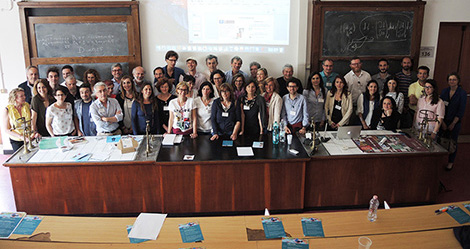
Connecting, engaging and nurturing EMBLs global community of current and former scientists, technicians, communicators and administrators

The first ‘EMBL in Italy’ event, hosted by EMBL Monterotondo Heads Phil Avner and Cornelius Gross, was held in Rome, where EMBL has its largest number of Italy-resident alumni. 80 alumni and their networks gathered at La Sapienza University to hear about EMBL Monterotondo’s research directions in epigenetics and neurobiology, to share their current works and interests and to find out more about resources and opportunities available to them.
We interviewed two of the speakers to find out more.
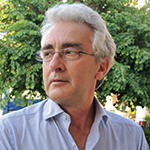
Now: Professor, La Sapienza University, Rome.
EMBL Heidelberg: Postdoctoral Fellow, Genome Biology, Melli group, 1981–4.
EMBL was already an exciting place in the early 80s: both the institute and the Gene Expression Programme (now Genome Biology Unit) were very young, powered by a small but vibrant community of around 200 scientists. We all had the feeling of being part of something new and exciting, which would allow us to open new ‘boxes’ of knowledge without the pressure to deliver specific applications.
Breaking boundaries
Strong in my memory are “wow!” conferences covering the discovery of the first oncogenes, as well as Walter Gehring’s landmark talk on Antennapedia. This spirit of going beyond current knowledge and always preparing for the next steps has shaped my approach to science. During my EMBL years, I studied transcription mediated by polymerase 2 and 3, mostly in liver cells. Like most alumni, I specialised after leaving EMBL – but I also kept one eye on the ‘bigger picture’. I still work on the same tissue, but new technologies and ‘big data’ are allowing us to dig much deeper into the complexity of the processes.
Next-generation scientists
Many of the talks at the “EMBL in Italy” event were focused on networks of molecules: I find this topic absolutely fascinating! As a professor, I want to convey this fascination for learning to my students and in turn make a strong contribution to training the next generation of motivated young scientists.
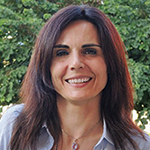
Now: Team leader, Santa Lucia Foundation, Rome.
EMBL Monterotondo: Postdoctoral Fellow, Gross group, 2003-9.
Five years as a postdoc in Cornelius Gross’ group have proven crucial to my career as a researcher. They were also extremely enjoyable from a personal perspective: EMBL really is a place that cares for its staff and where you are certain to meet great people.
Creative connections
Before my postdoc, my research focus was on behaviour and I used very little molecular biology. Studying gene expression and its links to the environment with Cornelius Gross allowed me to bridge that gap and make contributions to understanding the connections between experiences animals have as youngsters and their behaviour later in life. Cornelius is a great inspiration and a very important colleague.
Bringing light to behaviour
My current work focuses on the impact of the environment on young animals and the onset of mental health disorders later in their lives. We proved that mice pups who grow up in an aggressive environment tend to be more prone to cocaine addiction as adults; on the other hand, pups who grow alone, with little social interactions, tend to be more prone to depression in their adulthood. In both cases we are able to link the behaviours to specific gene expression patterns, and that could give us clues to understanding similar patterns in humans.
Isabelle Kling
Phil Avner, Head, EMBL Monterotondo
Oxana Bereshchenko, Researcher at the University of Perugia
Giulia Bolasco, Postdoctoral Fellow, EMBL Monterotondo
Valeria Carola, Team Leader, Santa Lucia Foundation, Rome
Gianni Cesareni, Professor, Tor Vergata, Rome
Roberto Cingolani, Scientific Director, Istituto Italiano di Tecnologia, Genova
Ennio De Gregorio, Head, Preclinical Research and Development, GSK Vaccines
Cornelius Gross, Deputy Head, EMBL Monterotondo
Roberto Di Lauro, Science Attaché, Italian Embassy UK, London & Vice Chair, EMBL Alumni Association Board
Giuseppe Testa, Professor of Molecular Biology, University of Milan & Director, Laboratory of Stem Cell Epigenetics
European Institute of Oncology
Marco Tripodi, Professor at the Sapienza University of Rome
Thomas Vaccari, Group Leader, The Firc Institute of Molecular Oncology, Milan
Phil Avner, Head, EMBL Monterotondo
Laura Ciapponi, Associate Professor of Genetics, Sapienza, University of Rome
Cornelius Gross, Deputy Head, EMBL Monterotondo
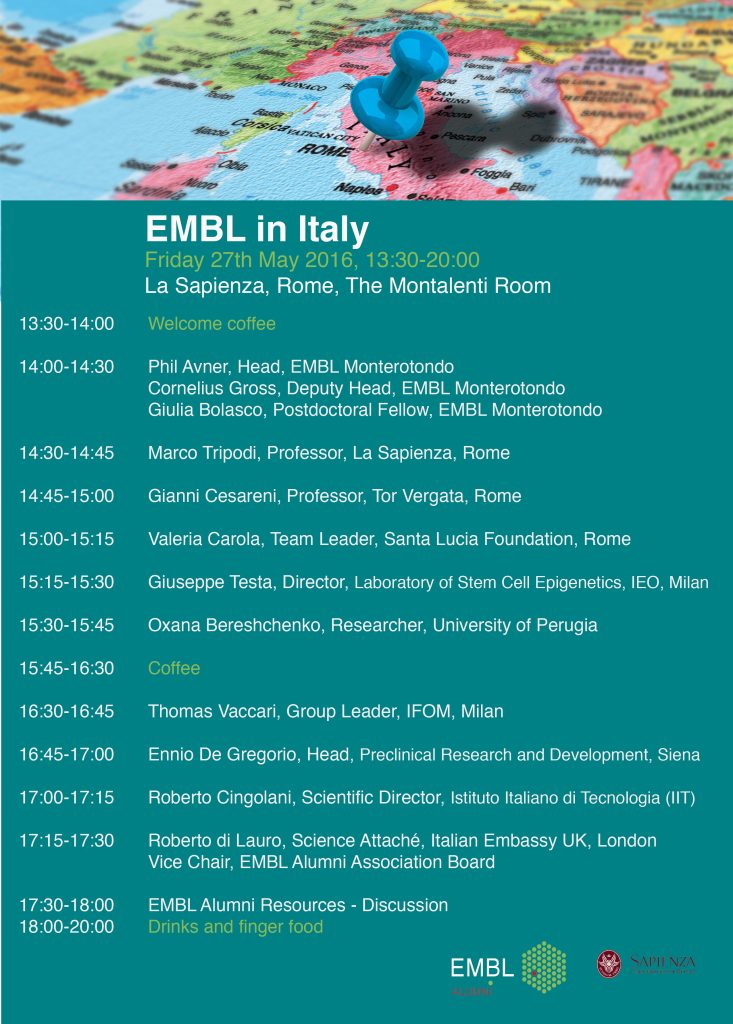
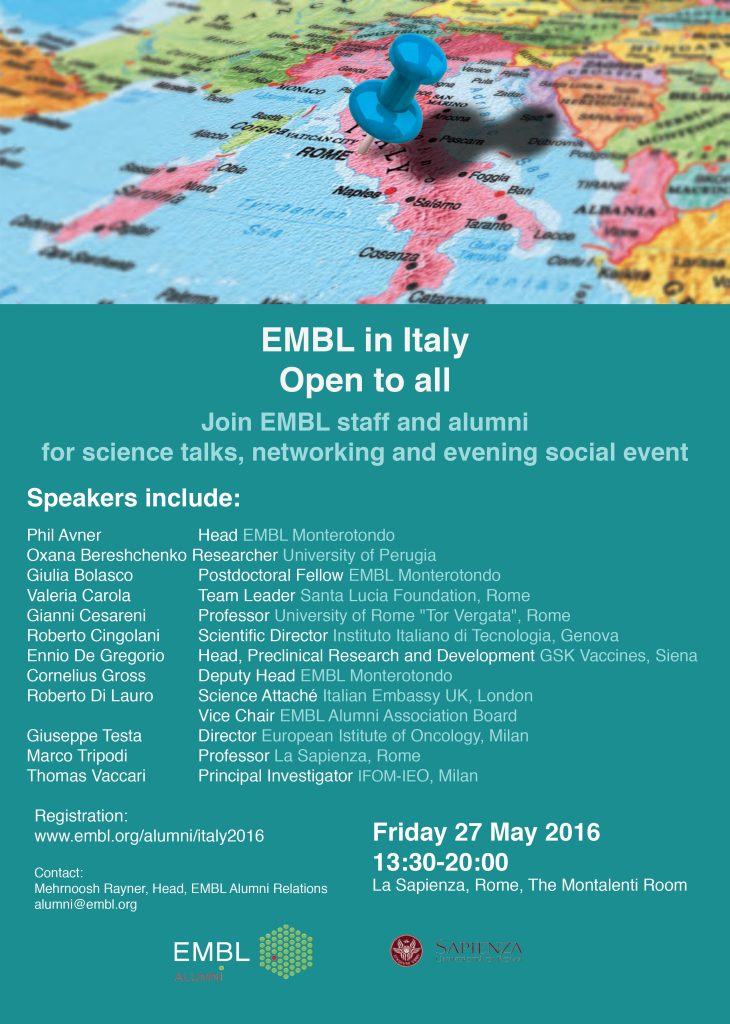

Did you know?
EMBL has 278 alumni in Italy of which 243 are Italian. 226 work in academia and 22 in industry. Cities attracting most alumni are Rome (67), Naples (30) and Milan (30).